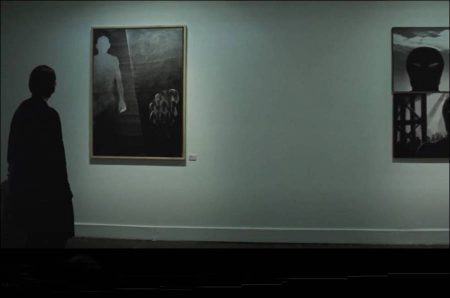Memoria begins with the first jump scare in Apichatpong Weerasethakul’s career, but the sudden impact isn’t as relevant as the way it resonates in the silence that follows. Anyone familiar with the slow-burn lyricism at the center of the Thai director’s work knows how he adheres to a dreamlike logic that takes its time to settle in.
The Colombia-set “Memoria,” his first movie made outside his native country, does that as well as anything in “Uncle Boonmee Who Can Recall His Past Lives” or “Cemetery of Splendor.” But this time around, there’s a profound existential anxiety creeping in.
Memoria is a 2021 internationally co-produced drama film written and directed by Apichatpong Weerasethakul. It stars Tilda Swinton, Elkin Díaz, Jeanne Balibar, Juan Pablo Urrego, Agnes Brekke and Daniel Giménez Cacho. It had its world premiere at the Cannes Film Festival on July 15, 2021.
In March 2018, it was announced Tilda Swinton had joined the cast of the film, with Apichatpong Weerasethakul directing from a screenplay he wrote. In August 2019, Jeanne Balibar, Daniel Giménez Cacho, Juan Pablo Urrego and Elkin Diaz joined the cast of the film. Principal photography began in August 2019, in Colombia.
In November 2019, NEON acquired distribution rights to the film. It had its world premiere at the Cannes Film Festival in July 15, 2021. It was awarded the Jury Prize.
Film Review for Memoria
Musing on the power of memory and the fluidity of time, the latest from Thai director Apichatpong Weerasetakul sees him returning to the Cannes competition for the first time since his surprise Palme d’Or triumph in 2010 with “Uncle Boonmee Who Can Recall His Past Lives.”
“Memoria” certainly brings back memories of that otherwordly win under the aegis of jury president Tim Burton. But the Thai director’s slow, contemplative, karmic style is so far from the kinetic visual rush of this year’s president, Spike Lee, that another win would be a seismic shock.
Starring Tilda Swinton, “Memoria” is a film from another planet, a cinematic vision unlike any other in the Cannes running and unique because of its filmmaker’s philosophical long takes. Swinton, who is also credited as executive producer, plays Jessica, a haunted British woman who wanders the streets of Colombian cities Bogota and Medellin as if in suspended shock from a loud bang she keeps hearing. It’s an almost elemental sound, the search for the origin of which becomes her existential quest.
“It’s like a large rock dropped into a well, surrounded by a sea and exploded,” she tries to tell a recording engineer, Hernan, who has offered to help her recreate her “sound” in his studio. This echoing thud crunches through the film at various points, really reverberating through the viewer. It could be the march of revolutionary boots, the sound of a gun, a bomb, ancient tribal drumming or the heartbeat of a baby in a womb. Or, as Hernan’s library of noises has it, “Blanket Hit by Bat Wood,” but with more “roundness” and more “earthiness”.
Jessica goes into a far-off trance when she hears it, which can be at any moment – in a restaurant or library, or on a search for a fridge in which to store orchids. Swinton plays Jessica with a leaden gait, walking as if in a slump, slightly zombie-like but always with a hypnotized stare, which makes her wary of stray dogs and drawn to music.
It’s unclear what she’s doing in Colombia or why she befriends a forensic researcher played by French actor Jeanne Balibar, who shows her a 6,000-year-old skeleton of a little girl with a hole in her skull “to let the bad spirits out.” When she goes to find Hernan again, he has disappeared and no one at the studio seems to know who she’s talking about. Audiences might well feel the same struggle to connect.
The film makes a sudden shift – if anything Weerasethakul does can be called sudden – from the city to the jungle via an excavation for a vast tunnel through the mountain forests, where the ancient skeleton was discovered. Jessica is still in search of her sound. Does it beat louder here in the lush green valleys? She says she cannot sleep (troubled by some kind of tropical malady no doubt) and a local doctor tells her: “There are a lot of people in this town with hallucinations.” But this medic prefers to dose out pamphlets about Jesus than pills.
Following a shallow stream in the jungle, Jessica comes across another man who is scaling fish. In a lengthy, unblinking scene that holds its locked-off camera stare for over 20 minutes, Jessica and this older man, also called Hernan, discuss the noises of life, from the howler monkeys he claims to understand to the things he misses by never watching TV or movies. “There are already so many stories,” he says sagely. “And our kind doesn’t dream.”
What does he mean? Where is this going? Soon, Hernan is lying down on the grass, going to sleep but with his eyes wide open. Which is exactly how you may feel watching “Memoria.” There is silence, the whisper of trees, the buzz of insects and then this sound, Jessica’s sound.
It feels counterintuitive to detail the plot of any Apichatpong – they just call him Joe – movie, because they’re not really about story. Yet their meaning and explanation always remain out of reach, a numinous viewing experience that can offer up both richness and alienation.
And there’s an alien aspect to Swinton here. This isn’t the arch character actor of the Wes Anderson world, nor the smart, poetic, intellectual documentary talking head. It’s art-installation Tilda, performance Swinton, with her stilted Spanish, occasional banalities and hollow silences. She’s channeling Bowie in “The Man Who Fell To Earth” and it’s as perplexing and odd to watch as it is fascinating. Her whole body is a divining rod for emotion, her legs ungainly, her hair matted, no hint of make-up or vanity, a beige anorak instead of the high-fashion goddess who walks the Cannes red carpet before the film.
Look, it ain’t “Space Jam.” You can hate “Memoriam” but that won’t do you much good. It isn’t for everyone but it is about everyone – what we’re doing here on this earth and the spirits with whom we share it for whatever transient, ungraspable time we’re here. It’s not the sort of thing that needs poster quotes and star ratings. It wouldn’t know what to do with them. But it is cinema that, if you let it, can check our heartbeats, frustrate our minds and connect with our very souls.
Directed by: Apichatpong Weerasethakul
Starring: Tilda Swinton, Elkin Díaz, Jeanne Balibar, Juan Pablo Urrego, Daniel Giménez Cacho, Agnes Brekke, Jerónimo Barón, Constanza Guitérrez, Daniel Toro
Screenplay by: Apichatpong Weerasethakul
Production Design by: Angélica Perea
Cinematography by: Sayombhu Mukdeeprom
Film Editing by: Lee Chatametikool
Costume Design by: Catherine Rodríguez
Set Decoration by: Lulú Salgado
Art Direction by: Juan Diaz B.
Music by: César López
MPAA Rating: None.
Distributed by: NEON (United States)
Release Date: July 15, 2021 (Cannes), July 15, 2021 (United States)
Views: 55





